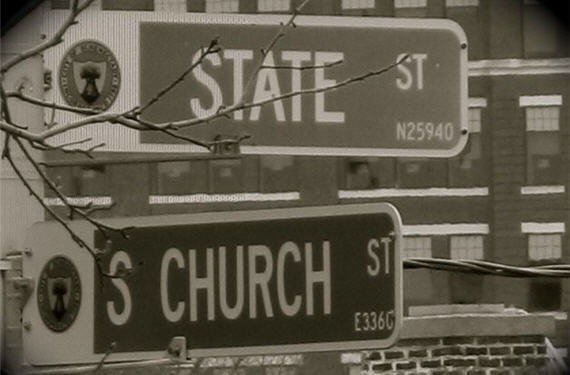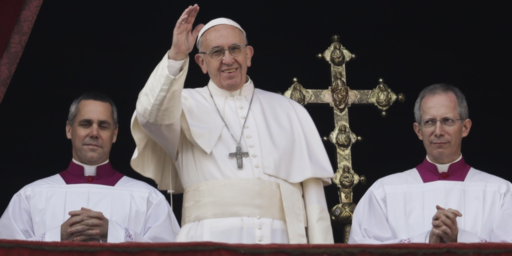Alabama Town Forces Criminals To Go To Church To Avoid Jail
A local Alabama television station reports on what clearly seems to be a violation of the First Amendment:
Non-violent offenders in Bay Minette now have a choice some would call simple: do time behind bars or work off the sentence in church.
Operation Restore Our Community or “ROC”…begins next week. The city judge will either let misdemenor offenders work off their sentences in jail and pay a fine or go to church every Sunday for a year.
If offenders elect church, they’re allowed to pick the place of worship, but must check in weekly with the pastor and the police department. If the one-year church attendance program is completed successfully, the offender’s case will be dismissed.
(…)
[Bay Minette Police Chief Mike] Rowland says the program is legal and doesn’t violate separation of church and state issues because it allows the offender to choose church or jail…and the church of their choice.
Not so fast there Chief. As Eugene Vololkh points out, this go-to-church-or-go-to-jail rule is clearly a violation of the Establishment Clause:
Both conservative and liberal Justices agree that coercion of religious practice violates the Establishment Clause. And while they disagree on what counts as coercion of religious practice (e.g., does being exposed to prayer, and socially pressured to stand and remain silent, at a high school graduation ceremony that isn’t legally required, qualify as coercion?), this is not a close case: Just as it would coerce religious practice to say someone who hasn’t been convicted of a crime, “go to church or we’ll send you to jail,” so it coerces religious practice to say someone who has been convicted of a crime, “go to church or you’ll stay in jail.”
Volokh goes on to point out that there is case law from elsewhere in the country establishment that such provisions as a condition of bail are unconstitutional, so there’s no reason to believe the law would be different with respect to persons who have been convicted. In neighboring Mississippi, another local judge was recently suspended for 30 days after ordering church attendance as a condition of bail. Moreover, the Alabama Constitution seems to speak very clearly on this issue:
That no religion shall be established by law; that no preference shall be given by law to any religious sect, society, denomination, or mode of worship; that no one shall be compelled by law to attend any place of worship; nor to pay any tithes, taxes, or other rate for building or repairing any place of worship, or for maintaining any minister or ministry; that no religious test shall be required as a qualification to any office or public trust under this state; and that the civil rights, privileges, and capacities of any citizen shall not be in any manner affected by his religious principles.
This is clearly illegal, and will presumably stop now that attention has been brought to it. One wonders, though, how often things like this happen in small towns without anyone finding out.







I agree that its probably unconsitutional.
Having been through Bay Minette a few times, its in the Mobile metro area, sprawly and relatively poor. The demographics suggest to me that they probably had good intentions in trying to alleviate the payment of a fine with some compabable demonstration of contrition.
The Press-Register adds:
So the option is go to jail or go to a Christian church. Not only that, but oversight of the offenders participation in the program would be handled not by a government parole/probation officer, but by the pastors at the churches:
So at any time, for likely any reason, a pastor could get the offender sent to jail. Brilliant.
The Press-Register also notes some other examples:
I’d really like to get the name and state bar association contact # of the person who told him that. Alternatively, if that’s purely the “legal” “opinion” of the Chief (which seems vastly more likely), I’d like to see him in court for practicing law without a license. Or perhaps fired for incompetence, since he’s just cost his town, at a minimum, several hundred thousand $$ worth of legal bills by thinking he gets to decide how the Constitution is interpreted…
No mention of community service. I wonder if they used to have that as the “jail or” choice, or if this replaced it.
Constitution aside, I’d have no problem with this as an option, but I sense something else was displaced.
How is this a deterrent to crime? Are we to believe our jails are full of citizens who never once went to church? Oops, I forgot about Jim Bakker…there just can’t be others…can there?
Are we to believe our jails are full of citizens who never once went to church?
Apparently. As pastor in the linked video tells us, “You show me somebody who falls in love with Jesus, and I’ll show you a person who won’t be a problem to society.” So there you go. Christians can’t be problems for society. QED.
@mantis: “So the option is go to jail or go to a Christian church.”
There are Muslim and Jewish places of worship in downtown Mobile, which is about a half hour drive. The facts are what they are without contriving new claims.
There are Muslim and Jewish places of worship in downtown Mobile, which is about a half hour drive. The facts are what they are without contriving new claims.
They aren’t participating in the program. You were saying something about facts?
While I am totally in agreement with the “it’s illegal” claim, this is still a false equivalence. In the first case the victim had a plethora or opportunities (go to church, go to the cinema, watch TV etc.) and the choice was subsequently limited to two alternatives. It’s freedom-reducing.
In the second case society already legitimately limited the choices to the single “go to jail”. In this case offering another option may very well be coercive and violate the establishment clause, but it’s not a moral equivalent since it doesn’t reduce freedom of choice but increases it.
I’m pretty much a god-hater but I have mixed thoughts about this. On one hand, this is pretty obviously unconstitutional and the thought that church attendance automatically makes someone a better person is stupid; on the other hand our judicial system is basically broken and the more people protected from Alabama’s prison system or indeed prisons period, the better.
I’d certainly choose church over jail, church sucks but it’s better than prison.
I think that this is a great idea – the churches need the help and it won’t hurt these people to hear the life changing Good News! If more of the US population would start attending church, the prison population would decrease dramatically. For once, a judge with good judgment!
@mantis: Read what you quoted again:
Its not that Jews and Muslims are not participating in the program, some critics are claiming that the few mosques or synagogues in the area make participation difficult. Its a red herring. These religious places of worship exist in the metropolitan area. The question to ask “some critics” is whether people in Bay Minette can be compelled to go to Mobile to serve on a federal jury for long days at weeks, even months at a time.
I agree about the point about atheists, however.
I’m sure it’s unconstitutional and personally I am not religious and strongly believe in the separation of church and state. All that said, church is definitely good for some people. I know at least a couple serial drunk drivers who have “found God” and have been sober for well over a year (much longer than between their stints in the slammer!). Some people are lost and really do need to ‘cling’ to something, as Obama once said, and I don’t have a problem with it if it keeps them out of trouble.
Besides the unconstitutional aspects of the program, this also seems rather unfair to the victims. If I had been robbed, had my car stolen, defrauded, etc. I’d be rather pissed to find out the guy responsible had faced neither fine nor jail time because the judge is more interested in being a missionary than a judge.
@PD Shaw:
Spoken by someone who has never had to deal with not having a car or not living close enough to public transportation. Do you know how hard it is to go 30 miles without a car or public transportation?
Is there a Rastafarian temple in the area?
The constitutionality of this can’t even be seriously argued. I’m an atheist, and I’d go fake it in church for a year to stay out of jail. And so would everyone else. That is why this is just as compulsory as any other court-ordered church attendance. Pretty much any diversion they can possibly offer is better than jail. It becomes functionally compulsory.
@racehorse: “If more of the US population would start attending church, the prison population would decrease dramatically.”
-Please substantiate this claim.
Afterthought. When you verify this assertion will you be counting current prisoners who attend religious services while incarcerated? Christians, Muslims, American Indians, White Supremacists, others…?
Franklin sez: “…I know at least a couple serial drunk drivers who have “found God” and have been sober for well over a year…”
-I have known more than one inactive alcoholic who stated that stopping drinking had nothing to do with a belief in god and that they were either atheist or agnostic.
-I have also known more than a few devout god believers with a long history of alcohol abuse.
-I have known more than one inactive alcoholic who stated that stopping drinking had nothing to do with a belief in god and that they were either atheist or agnostic.
Now you know another. I haven’t drank a drop in more than ten years now, and when I was getting that monkey off my back, it only took one AA meeting to realize that there was way too much religion in that organization for me. Cede my own agency to a mysterious “higher power,” without whom I could not possibly abstain (step 2 of the 12 steps)? No thanks. I did it on my own. If believing they are being helped by supernatural forces helps some drunks to get off the sauce, I’ve got no problem with it, but it ain’t for me.
@mantis: Good on ya!
I gave up the swill not long before you did. I did consult with a professional alcoholism counselor for a session or two but that was it.
When anyone asks me why I stopped drinking I just tell them it was a good idea at the time and that it is still a good idea.
I can tell they don’t get it by the look on their face but I can’t help them with that.
@Ernieyeball: I think you missed my point, which was that religion was helpful for some people. Everybody has their own motivations for good behavior.
@Franklin: I got your point. I do not agree with it.
Back to the drawing board..
Politics & MoneY